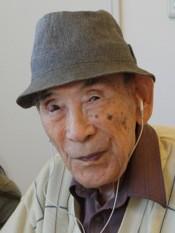Dichter
Michio Mado

Michio Mado
(Japan, 1909 - 2014)
Biografie
For the last half a century, literally everyone in Japan, of any age, has been familiar with the children’s song ‘Little Elephant’. This, and other well-known songs by the same writer, are almost as popular as Mother Goose nursery rhymes in the English-speaking world. But not many knew that these verses were written by a man named Michio Mado, and even fewer were aware that Mado was in fact a serious artist, both in poetry and in painting – that is, until 2009, when Mado’s 100th birthday was widely celebrated across the nation.
After returning to Japan in 1946 at the age of 37, Mado worked for about ten years as an editor for a children’s magazine, and then became a freelancer, writing mostly children’s songs for a living, but also working on poems for himself. From his mid 50s, Mado developed a passion for painting as well. He has published numerous books of poetry and children’s verse, and been awarded with many prestigious literary prizes, including the Hans Christian Andersen Award in 1994.
Despite his renowned reputation around the world as a children’s writer and his recent celebrity as a 100-year-old poet, Mado’s poems have rarely been published in mainstream literary magazines or discussed by literary critics. For them, Mado’s poems may appear too straightforward and ‘easy’ to be taken ‘seriously’. But Shuntaro Tanikawa has long recognised the beauty and the depth of Mado’s works and selected poems of his for the audiobook anthology Masters of Modern Japanese Poetry: Six Distinctive Vocies of the Postwar Era (The Morris-Lee Publishing Group, Rosemont, NJ, 1999), along with Kiyoko Nagase, Rin Ishigaki, Yukio Tsuji, Hiromi Itō and himself. (All of these poets, except for Shuntaro Tanikawa, have been introduced on PIW together with the audio recordings from this CD-book, courtesy of Shuntaro and the publisher).
In his poem ‘Why All the Time’, Mado points to the nature around him and wonders:
The sun
The moon
The stars
And
The rain
The wind
The rainbow
The echoes in the mountains
Why are
Only the oldest
Always the newest?
It is precisely this kind of wonder that one feels about Mado’s poems, which are uncomplicated and simple, yet surprisingly fresh.
© Yasuhiro Yotsumoto
Select bibliography (poetry)The Animals, Suemori Books, Tokyo / Margaret K. McElderly Books, NY, 1992 (A Japanese-English bilingual edition with the English translations by Empress Michiko)
Mado Michio Zenshu (The Complete Collection of Michio Mado Poems), Rironsha, Tokyo, 1993
Tooi tokoro (Distant Place), Shinchosha, Tokyo, 2003 (A collection of poems and paintings by the poet)
Link
Michio Mado’s official website
Gedichten
Gedichten van Michio Mado
Sponsors
























